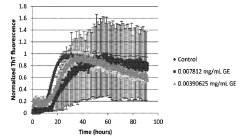Competitive Advantages
- Alternative therapy for Alzheimer's and Parkinson's disease
- Treats underlying pathology instead of symptoms
- Few adverse side effects
Summary
Alzheimer’s disease is a common neurodegenerative disorder and is the primary cause of senile dementia worldwide. Alzheimer’s disease is pathologically characterized by the formation of amyloid beta peptide plaques within the brain. Therefore, the disruption of the pathway to amyloid beta aggregation could serve as a promising approach to the treatment of Alzheimer’s disease. The prickly pear cactus plant (Opuntia ficus indica) contains a compound called mucilage, a pectin polysaccharide. Polysaccharide compounds are known to present anti-inflammatory properties, enhance tissue regeneration, disperse high molecular weight compounds, and participate in brain development and learning.
Our researchers have developed a method of treating amyloid disease found in both Alzheimer’s disease patients and Parkinson’s disease patients. They have shown that the plant mucilage extract effectively interferes with the protein accumulation pathway in the brain and successfully targets the amyloid beta protein plaques. Experimentally, both the gelling and non-gelling forms of the mucilage have been shown to disrupt the pathway leading to amyloid beta aggregation.

Effects of Extract on Aggregation Kinetics of α-Synuclein
Desired Partnerships
- License
- Sponsored Research
- Co-Development